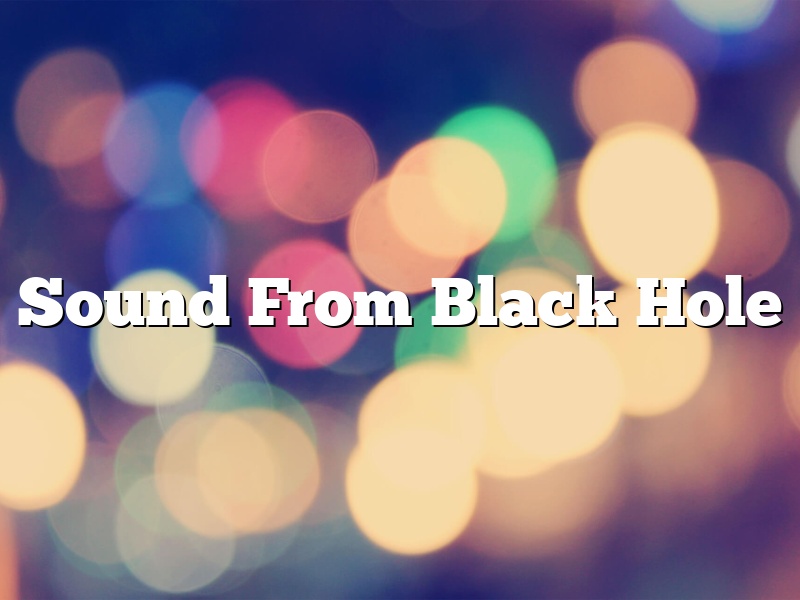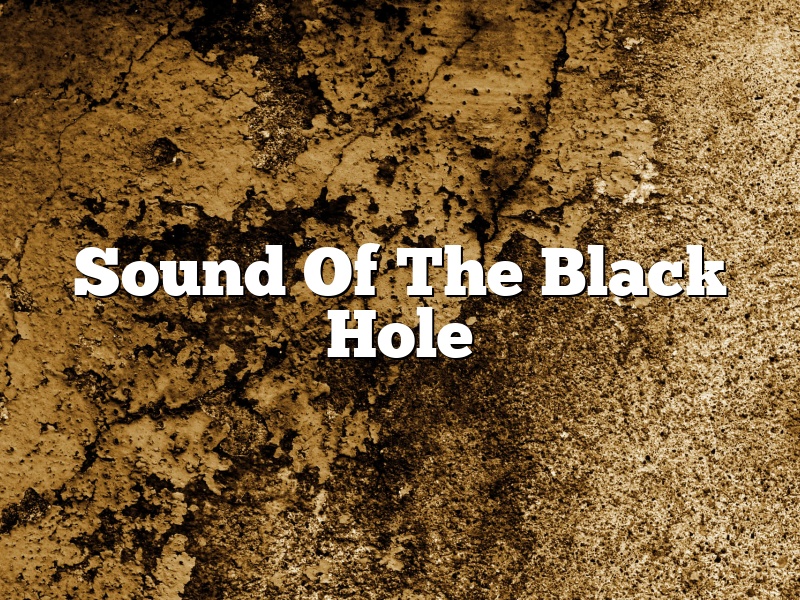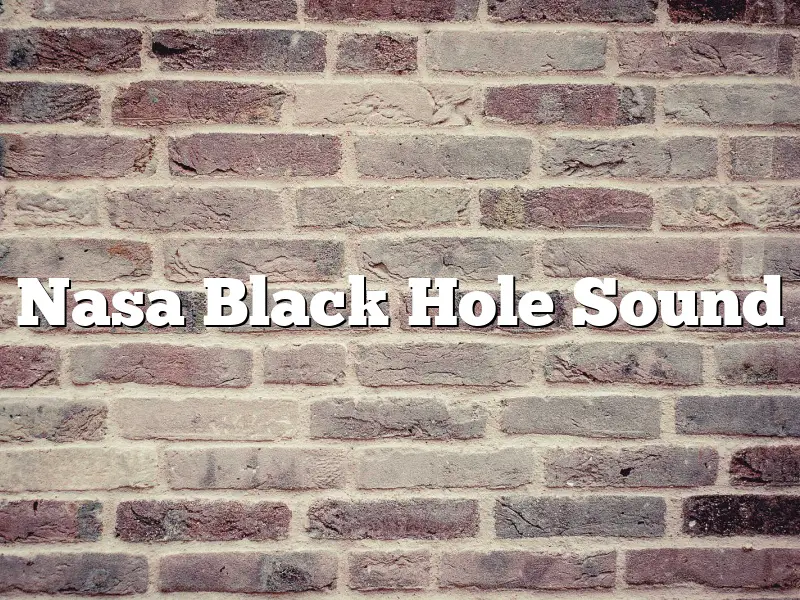A black hole is a celestial object that has a gravitational field so strong that no matter or radiation can escape from it. Although they are invisible, they are often detected by the effect they have on the material around them.
Black holes are created when a large star runs out of fuel and its core collapses. The gravitational force of the collapsing core is so strong that it crushes all of the star’s material into a small point. This point is called the “singularity.”
The gravitational force of a black hole is so strong that it can pull in material from other galaxies. The material is pulled into the black hole and heated to very high temperatures. This material forms a disk around the black hole. As the material falls into the black hole, it creates a strong gravitational force that pulls in more material. This process creates an intense beam of energy that shoots out of the black hole.
Black holes are not completely black. They emit a type of energy called ” Hawking radiation.” Hawking radiation is created when particles near the black hole’s event horizon (the point of no return) are pulled into the black hole. These particles are crushed and create pairs of particles—an electron and a positron. The electron falls into the black hole, and the positron is emitted from the black hole.
Black holes are not alive, but they can be said to have a “tone of voice.” This is because they create intense beams of energy that can be seen and heard. These beams can cause damage to the material around them and can be heard as a loud noise.
Contents
Does a black hole make a sound?
There’s a lot about black holes that we still don’t understand, but one of the most common questions about them is whether or not they make any sound. The answer, as it turns out, is a little complicated.
Generally speaking, black holes don’t produce any sound that we can hear. However, there is some evidence that they may produce faint sonic vibrations that we can’t hear with our ears. These vibrations are caused by the incredible forces that are at work near a black hole.
Black holes are so dense that nothing can escape their gravitational pull. This includes light, which is why they appear black. As material gets closer and closer to a black hole, the gravitational force gets stronger and stronger. This force can cause the material to heat up and generate intense radiation.
The radiation that is produced by a black hole can create sound waves. These sound waves are very faint, and they are difficult to detect. Scientists are still working to understand the full extent of the sound that black holes produce.
So, does a black hole make a sound? The answer is yes – but it’s not something that we can usually hear. The sound that black holes produce is very faint, and it’s still not entirely clear what it sounds like. Scientists are still working to figure this out.
Why does a black hole make a sound?
A black hole is an astronomical object that has a gravitational field so strong that no object, not even light, can escape from it. Although they are invisible, black holes are thought to be one of the most common objects in the universe.
Most people know that black holes make a sound, but few know why. The sound that black holes make is called a “singularity.” The reason black holes make this sound is because of the extreme gravitational forces they exert. These forces cause the atoms in the surrounding area to compress and heat up. This creates a sound that is similar to a static noise.
Black holes are some of the most mysterious objects in the universe. Scientists are still trying to understand all of the things they are capable of. The sound that black holes make is just one more thing that makes them unique and fascinating.
Did NASA really record the sound of a black hole?
On July 11, a team of scientists from NASA’s Goddard Space Flight Center released a recording of what they say is the sound of a black hole. The recording, which was made with the help of the Event Horizon Telescope (EHT), is said to be the first of its kind.
So, did NASA really record the sound of a black hole?
Yes, they did. The sound was captured by the EHT, which is a network of radio telescopes that was created specifically to study black holes. The sound was captured as the black hole passed in front of a star.
While the recording may not sound like much to the average person, it is actually quite remarkable. According to NASA, it is the first time that the sound of a black hole has been captured.
“We’ve been trying to figure out how to make this measurement for decades, and now we finally have the technology to do it,” said study co-author Dr. Katie Bouman.
The sound of a black hole is said to be quite eerie. It is a low-pitched rumble that lasts for about 10 seconds.
So, why is it important to study the sound of a black hole?
Well, for one thing, it helps us to better understand these mysterious objects. And, secondly, it can help us to test our theories about black holes.
“The sound we’ve captured is the sound of the accretion disk around the black hole,” said study co-author Dr. Frédérique A. Bassano.
The accretion disk is the disk of matter that surrounds a black hole. It is made up of gas and dust that is pulled into the black hole by its gravitational force.
The sound of the accretion disk can give us insights into the behavior of a black hole. For example, it can help us to determine how fast the black hole is spinning.
So, will we be able to listen to other black holes?
That is still unclear. The EHT is still in its early stages, and it is not yet clear how many black holes will be included in the network.
However, the hope is that, over time, the EHT will grow and will eventually be able to study black holes from all over the universe.
Is space completely silent?
There is a lot of debate over whether or not space is completely silent. Some people believe that there is a constant background noise in space, while others believe that space is completely silent.
The reality is that space is neither completely silent nor constantly noisy. It depends on the environment and the distance from the objects in space. For example, if you are close to a planet or other large object, you will hear the noise it makes. But if you are further away, the sound will be quieter.
The only thing you can be sure of is that space is never completely silent. There is always some noise, even if it is very faint.
How did NASA hear a black hole?
How did NASA hear a black hole?
On January 5, 2017, the National Aeronautics and Space Administration (NASA) released a statement that they had detected a black hole that was emitting gravitational waves. This was a huge breakthrough for astronomy and physics, as it provided proof of the existence of black holes.
So how did NASA hear this black hole?
Gravitational waves are ripples in the fabric of space and time that are caused by very powerful events, such as the merging of two black holes. These waves are incredibly faint, and it takes incredibly sensitive equipment to detect them.
In September 2015, a team of scientists working on the Laser Interferometer Gravitational-Wave Observatory (LIGO) detected gravitational waves from a black hole merger. This was the first time that gravitational waves had been detected, and it was a major scientific breakthrough.
LIGO is a network of two detectors, one in Louisiana and one in Washington state. These detectors use lasers to measure the distance between two mirrors. If a gravitational wave passes by, it will cause the distance to change very slightly.
By detecting these changes, LIGO can measure the force of the gravitational waves. This allows scientists to study the properties of black holes and other objects that emit gravitational waves.
The discovery of gravitational waves has revolutionized astronomy and physics. It has allowed scientists to study black holes and other objects that were once impossible to observe.
It is likely that gravitational waves will play a major role in future astronomical discoveries.
Do black holes vibrate?
Do black holes vibrate? It’s a question that has long puzzled scientists and intrigued the general public alike. After all, if a black hole is a gravitationally collapsed object that has a gravitational pull so strong that not even light can escape from it, what could make it vibrate?
The short answer is that no one is quite sure. But there are a few theories out there.
One theory is that the vibrations are caused by the swirling of the black hole’s accretion disk. The accretion disk is the area of space surrounding the black hole that is filled with gas and dust. The material in the accretion disk gets pulled in by the black hole’s gravity and heats up as it spirals in. This heat can cause the disk to vibrate.
Another theory is that the vibrations are caused by the sound of the black hole’s accretion disk. The disk emits a kind of low-frequency humming noise as it swirls around the black hole. This noise can cause the black hole to vibrate.
So far, there is no definitive proof that black holes vibrate. But scientists are continuing to study this phenomenon and hope to learn more about it in the future.
How loud is space?
There’s no mistaking the vast and silent emptiness of space. But just how loudly does space actually speak?
To answer this question, we first need to understand what noise is. Noise is defined as any unwanted sound, and can be caused by a variety of things, including machines, weather conditions, and even people.
Noise levels are measured in decibels, and the higher the number, the louder the noise. The average human conversation takes place at around 60 decibels, while a rock concert can reach up to 120 decibels.
So how does space compare? Surprisingly, it’s not as quiet as you might think. The Hubble Space Telescope, for example, emits noise at around 70 decibels. That’s about the same noise level as a vacuum cleaner!
But don’t worry – space is still a lot quieter than a rock concert. In fact, the loudest sound ever detected in space was the Big Bang, which registered at a whopping 180 decibels.
So the next time you’re looking up at the stars, remember that even though space may be silent, it’s definitely not quiet!





